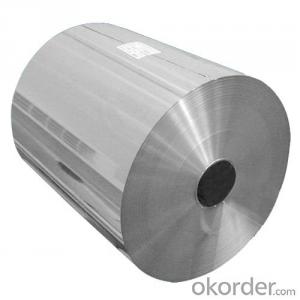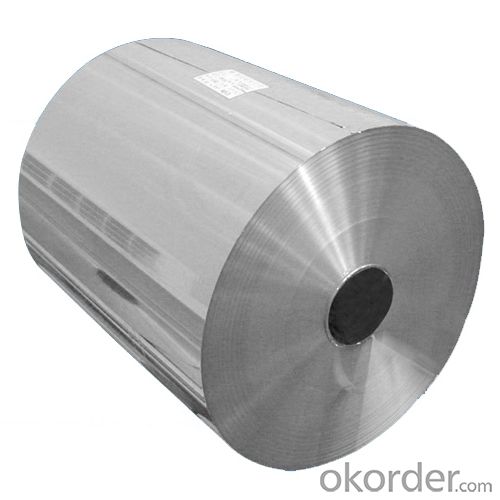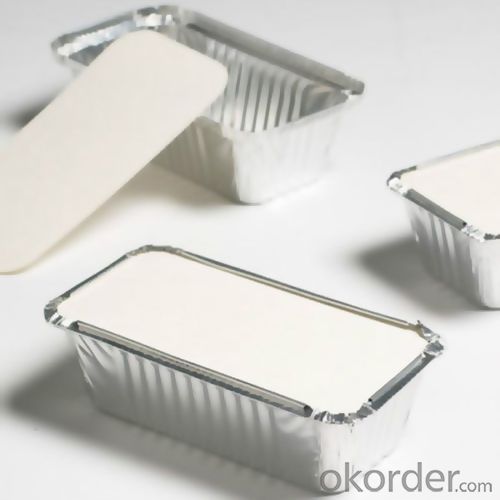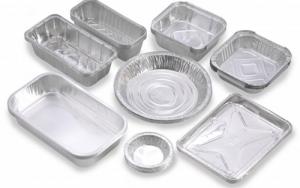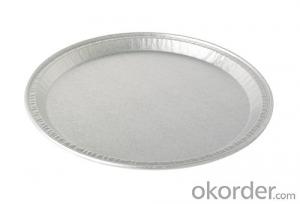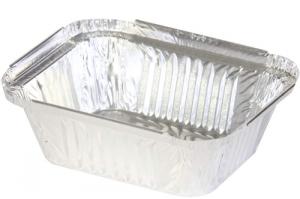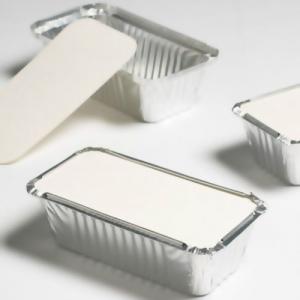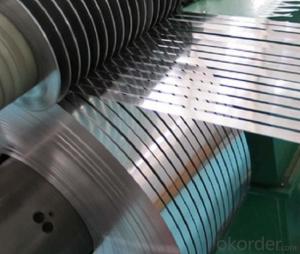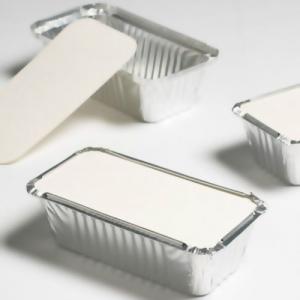Customized Painted Aluminum Coil for Food Container Trays in Jumbo Roll
- Loading Port:
- China main port
- Payment Terms:
- TT OR LC
- Min Order Qty:
- 3 m.t
- Supply Capability:
- 10000 m.t/month
OKorder Service Pledge
OKorder Financial Service
You Might Also Like
Specification
1. Description of Aluminium Foil in Jumbo Roll for Food Container Trays
Aluminum foil aluminum alloy :1235 /8011/8079
Aluminum foil width and length :according to your request
Aluminum foil Core ID :76.2mm &152mm
Aluminum foil temper : o /h12 / h24
Final usage: insulation aluminum foil / lidding aluminum foil /tag and lable aluminum foil / container aluminum foil / food and pharmaceutical packing foil / cigarette aluminum foil
2. Specifications of Aluminium Foil in Jumbo Roll for Food Container Trays
Alloy: 8011 / 3003
Temper: O / H22 / H24
Thickness & tolerance: 0.05 - 0.2 mm (+/- 8%)
Width & tplerance: 200 - 1650 mm (+/- 1mm)
Mechanical properties: Tensile strength (U.T.S)≥49 Mpa, Elongation≥1%
Standard: GB/T 3198 / ASTM - B209 / EN546
3. Feature of Aluminium Foil in Jumbo Roll for Food Container Trays
*Such coil is specially designed to replace aluminum ingot, due to the high export tax of aluminum ingot, the coil has better price than ingot.
*This type of coil can fit customer's remelting furnace just like ingot, no need to make any change to the production line that was previously used for ingot. The standard coil size and weight is very suitable for the feed gate of furnace.
*This type of coil causes less material wastage than ingot when remelted.
*Our coil is made directly from ore, no need to go though the ingot making process, quality is much better than other suppliers who use ingot scrap to make coil.
Be free from Oil Stain, Dent, Inclusion, Scratches, Stain, Oxide Dicoloration, Breaks, Corrosion, Roll Marks, Dirt Streaks and other defect which will interfere with use
4. Certificate:
SGS and ROHS(if client request, paid by client), MTC(plant provided), Certificate of Origin(FORM A, FORM E, CO), Bureau Veritas and SGS (if client request, paid by client), CIQS certificate
5. Image of Aluminium Foil in Jumbo Roll for Food Container Trays
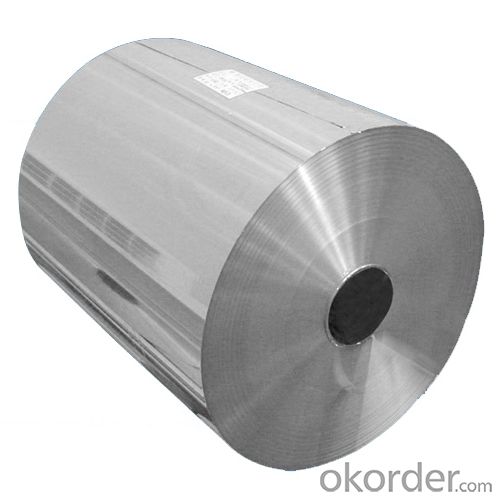
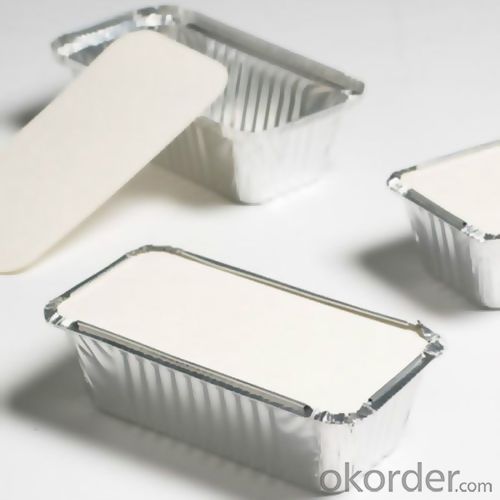
6. Package and shipping of Aluminium Foil in Jumbo Roll for Food Container Trays
eye to sky
eye to wall
with wooden pallet (wooden case also available)
7. FAQ
1) What is the delivery time?
Dpends on actual order, around 20 days
2) What is the QC system:
We have QC staff of 20 persons and advanced equipment, each production is with MTC traced from Aluminum ingot lot.
3) What market do you mainly sell to?
Australia, America, Asia, Middle East, Western Europe, Africa etc
- Q: What specific tools are required for handling and working with aluminum coils?
- <p>Working with aluminum coils typically requires specialized tools to ensure safety and efficiency. These include cutting tools like metal snips or shears designed for aluminum, which are crucial for cutting the coils without damaging them. Additionally, a coil carrier or uncoiler is necessary for handling and unrolling the coils without causing injury or deformation. Protective gear such as gloves and safety glasses is also essential to prevent injuries from sharp edges or debris. For more precise work, a metal straightener or leveling machine may be needed to correct any warping in the aluminum coils.</p>
- Q: Are aluminum coils suitable for electrical transformers?
- Yes, aluminum coils are suitable for electrical transformers. They have several advantages, including lower cost, lighter weight, and better thermal conductivity compared to copper coils. Additionally, aluminum coils have been widely used in power transformers, demonstrating their suitability for this application.
- Q: Aluminum is a metal and nitrate (nitrogen) is a non metal so shouldn't they form an ionic bond and not a covalnt bond? And if it were an ionic bond wouldn't it be called aluminum mononitrate? But it is a covalnt bond (thus a molecular bond and so there is no mono in the name). Pleas help I'm very confused!
- The questioner probably means aluminium nitride, AlN, which has substantial covalent character due to massive polarisation of the large nitride ions by the small and highly charged Al3+ ions.
- Q: Why does the heat preservation aluminum roll bend when it is cooled?
- Insulation aluminum coil will appear when the cooling bending phenomenon, reason is generally under the conditions of air cooling, the heat transfer coefficient of the aluminum coil insulation parts in contact with the air were flat, but because the wall thickness or different shapes, different parts of the heat dissipation rate is not balanced, resulting in thick wall or hollow tube heat faster than the thin Department of slow, resulting in insulating aluminum roll cooling occurs to the hollow part or thick walled parts of the twists and turns of the phenomenon.
- Q: How does the gauge of aluminum coils affect their performance?
- The thickness of the aluminum sheet used to make the coil determines the gauge of aluminum coils. The gauge is typically measured by its thickness, with a smaller gauge indicating a thicker sheet. The performance of aluminum coils is significantly influenced by their gauge. To begin with, the strength and durability of the aluminum coil are affected by the gauge. Thicker gauges offer greater strength and resistance to bending or warping, making them suitable for applications that require sturdy and long-lasting coils. Conversely, thinner gauges are more flexible but may be prone to damage or deformation, making them suitable for less demanding applications. Furthermore, the gauge affects the thermal conductivity of the aluminum coil. Thicker gauges have lower thermal conductivity, resulting in slower heating or cooling. This characteristic can be advantageous in applications where precise temperature control is crucial, as it helps maintain a stable environment. On the other hand, thinner gauges have higher thermal conductivity, enabling faster heat transfer. This can be beneficial in applications that require rapid heating or cooling. Moreover, the gauge affects the weight and cost of the aluminum coil. Thicker gauges are heavier and generally more expensive due to the increased amount of material required. This factor is important to consider in applications where weight or cost plays a significant role. Thinner gauges, being lighter and less expensive, are more suitable for applications that prioritize weight reduction or cost efficiency. Lastly, the gauge influences the ease of fabrication and formability of the aluminum coil. Thinner gauges are more easily bent, shaped, or formed into desired configurations, making them suitable for applications that involve intricate or complex designs. Although thicker gauges are less malleable, they can still be formed with specialized equipment or processes. In conclusion, the gauge of aluminum coils directly affects their performance. It influences their strength, durability, thermal conductivity, weight, cost, and formability. Therefore, selecting the appropriate gauge for a specific application is crucial to ensure optimal performance and efficiency.
- Q: Can aluminum coils be used in solar panel systems?
- Yes, aluminum coils can be used in solar panel systems. Aluminum is a popular material choice for solar panel frames and supports due to its lightweight yet strong nature. It is corrosion-resistant, durable, and has excellent thermal conductivity, making it suitable for withstanding harsh weather conditions and efficiently dissipating heat generated by the solar panels. Additionally, aluminum is also highly recyclable, which aligns with the sustainable nature of solar energy systems. Overall, the use of aluminum coils in solar panel systems contributes to their efficiency, longevity, and environmental friendliness.
- Q: need to know the procedure for removal of aluminum windows with brick trim
- Well, you have three options: 1. Do it right. Remove the brick trim, the paper flashing underneath. pry the nails in the nailing fin out, and remove the window. During install of the new windows, replace the flashings and caulk the gaps. Then replace the brick trim. 2. Retrofit it. There are window systems made now for this case. Essentially, you remove the glass and save the frame. The frame stays in the wall; the new system attaches to it, just inside the old frame. You can get low E glass or even double paned doing this. If energy is your concern, the old frames can be injected with urethane foam during the process. 3. Cut it out tight. Using a Sawzall, cut the frame tight to the brick. Order the new window for block set and caulk the bejeebies out of it. The problem with this approach is that you cannot replace or continue the flashing. You run some real risks of leakage.
- Q: Can a spring balance be used to accurately determine the weight of an aluminum coil?
- <p>Yes, you can use a spring balance to measure the weight of an aluminum coil, but the accuracy depends on the balance's specifications. Ensure the balance has a sufficient capacity to measure the coil's weight and is calibrated correctly. Keep in mind that spring balances are less precise than electronic scales, especially for heavy or sensitive measurements. For high accuracy, consider using an electronic scale designed for industrial use.</p>
- Q: Can aluminum coils be used in the manufacturing of medical devices?
- Yes, aluminum coils can be used in the manufacturing of medical devices. Aluminum is a lightweight and corrosion-resistant material that can be easily formed into coils, making it suitable for various medical applications such as imaging equipment, surgical instruments, and prosthetics.
- Q: What are the different hardness levels of aluminum coils?
- There are various hardness levels of aluminum coils, which are classified based on the alloy and tempering process used during their manufacturing. The most common hardness levels for aluminum coils are: 1. Soft (O temper): This is the most malleable and ductile state of aluminum coils. They are highly formable and suitable for applications that require extensive shaping or bending. 2. Quarter Hard (H12 temper): Aluminum coils in this hardness level have undergone a slight cold-working process, which increases their strength and stiffness. They are less malleable than soft coils but still retain good formability. 3. Half Hard (H14 temper): Coils in this hardness level have undergone a moderate cold-working process, resulting in further increased strength and stiffness. They are less formable than quarter-hard coils but are ideal for applications that require higher strength. 4. Three Quarter Hard (H16 temper): Aluminum coils in this hardness level have undergone a more intensive cold-working process, making them even stronger and less formable than half-hard coils. They are suitable for applications that require high strength and minimal deformation. 5. Full Hard (H18 temper): Coils in this hardness level have undergone the most extensive cold-working process, resulting in maximum strength and minimal formability. They are commonly used in applications that require high structural integrity and resistance to deformation. It is important to note that the specific hardness levels available for aluminum coils may vary depending on the alloy and manufacturer. Additionally, different industries and applications may have specific requirements for hardness levels, so it is crucial to choose the appropriate hardness level based on the intended use of the aluminum coils.
Send your message to us
Customized Painted Aluminum Coil for Food Container Trays in Jumbo Roll
- Loading Port:
- China main port
- Payment Terms:
- TT OR LC
- Min Order Qty:
- 3 m.t
- Supply Capability:
- 10000 m.t/month
OKorder Service Pledge
OKorder Financial Service
Similar products
Hot products
Hot Searches
Related keywords
